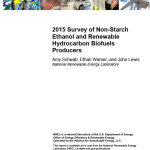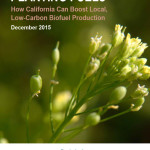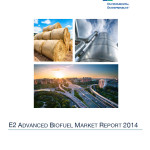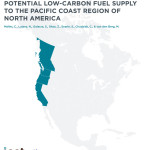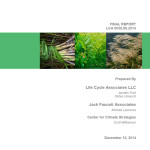Biofuel industry update, Part II
This blog is a continuation of last week’s update on the biofuel industry, as told by the biofuel companies themselves at the Advanced Biofuel Leadership Conference- Next in San Francisco and the Algae Biomass Summit in Orlando.
Last week we discussed that many companies are choosing to partner with process specialists in lieu vertical integration, and how research labs, universities, and feedstock producers are supporting biofuels. It’s clear that this is an inter-dependent industry with a culture of learning from and supporting one another.
Here is a quick overview of some of the updates we received from many biofuel production companies, poising themselves to deliver fuels to the market in the next year or two:
At Algenol, the St. Petersburg demonstration unit is testing its new vertical algae bags before expanding to commercial operations, also in Florida. The new vertical bags, which look a bit like IV bags, are a new step for a company that was previously known for its work in horizontal ponds. CEO Paul Woods intends to hit one million gallons of production in the next year.
Sapphire Energy is learning how to become both (algae) farmers and oilmen, and credits the value of its partnerships for these different skill sets. Their algae demonstration unit in New Mexico will also hit one million gallons in the next year, and they are preparing to tackle questions like whether the USDA should formally consider algae a farming product.
Clariant, a Swiss-based company, is looking at a platform for cellulosic sugar production called Sunliquid. They are learning from their demonstration plant in Europe, which utilizes wheatstraw as it is the dominant biomass available in the EU. With particular interest to the energy beet projects in California, Clariant is also working on a Liquebeet technology, which they state will increase the yields of beets by 10-12%.
ICM is working on a cellulosic ethanol technology which aims to make existing corn ethanol production more productive by utilizing some of the fiber from corn kernels. This fiber would be extracted from the front-end of the corn separation process through wet fractionation. Director of R & D Douglas Rivers hopes to pay for his low capital solution out of cash flow.
Aemetis, a traditional ethanol company with two facilities in India and California, reported the value LCFS is providing to existing companies for incremental improvements in their carbon intensity. CEO Eric McAfee reported that in September 2013, E85 surpassed gasoline as the cheapest fuel on the market, even on an energy density basis. Eric pointed out that this is proof of the competitiveness of biofuels – both traditional and advanced. With very few subsidies, corn ethanol is already outcompeting a highly subsidized industry, and it is making domestic jobs.
Lanzatech is using a process to convert flue gas from steel mills to ethanol. They report now looking at isopropenol, in addition to making 20 different products from their molecule.
Fulcrum’s new CEO, Eric Prior, announced intents to begin construction on their first commercial facility near Reno, NV in early 2014. Fulcrum has now contracted (post separation) municipal solid waste for sixteen plants. Interestingly, utilizing Fulcrum’s process increases recycling rates. Per their contract, they have the rights to everything in the post-separated material. So they sort through the material again, and pull out plastics, metals and other high value recyclables. This adds a level of recycling that otherwise would not occur, and eliminates a landfill end-of-life at the end of the process.
As a result of the biochar byproduct Cool Planet produces with their biofuel process, they are seeking certification of a carbon negative process. Biochar is a solid residual product made in an environment with less oxygen. The carbon rich material makes a fantastic soil fertilizer, with uses dating back to the native Amazonians. The carbon dioxide stored in soil by biochar successfully stays captured for thousands of years. Cool Planet will begin construction of its 10 million gallon facility in Alexandria, Louisiana in January of 2014.
While we heard from many more companies, these were some of the announcements that caught my attention. The advanced biofuel industry is one of rapid evolution, with each company working to provide a unique and complementary solution to our dependence on petroleum. I will continue to keep you updated with the latest industry news.
Filed in: Blog • Mary Solecki







